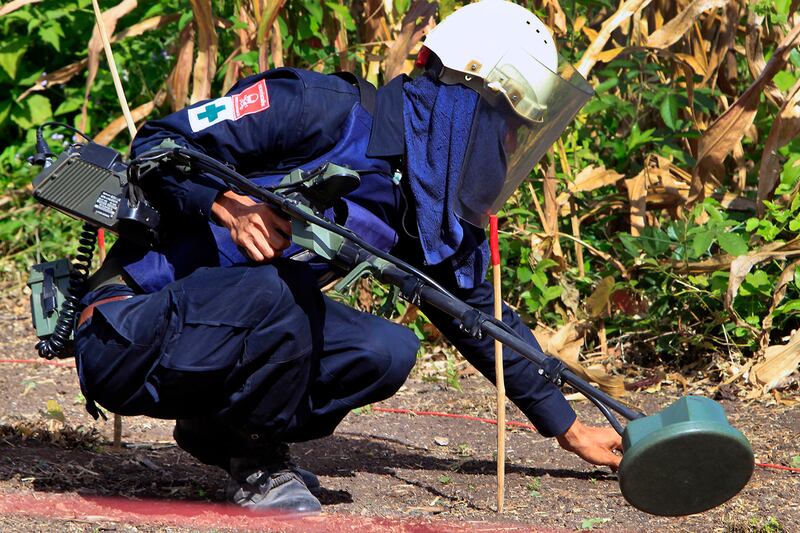The Chinese government will provide $4.4 million to Cambodia for landmine clearance in an announcement this week that comes two weeks after the United States froze nearly all foreign aid.
The Jan. 24 decision from the U.S. State Department was followed by a suspension of global demining programs, including grants to the Cambodian Mine Action Center, or CMAC, which said on Jan. 31 that it was halting operations in eight provinces for 85 days.
China’s embassy in Phnom Penh informed the Cambodian government of its grant last Wednesday. The $4.4 million will fund a year-long project to clear mines and unexploded ordnance. Beijing has provided funding to Cambodia for similar projects since 2018.
Cambodia is one of the most heavily mined territories in the world, with millions of landmines and other items of unexploded ordnance that has caused tens of thousands of casualties.

The ordnance is left over from the Vietnam War, when U.S. forces heavily bombed parts of neighboring Cambodia, but also include Chinese and Russian mines from the Khmer Rouge era in the 1970s and the Cambodian civil war of the 1980s.
Last month, the Trump administration said it was pausing U.S. foreign aid to give the State Department time to review programs “to ensure they are efficient and consistent with U.S. foreign policy under the America First agenda,” according to the announcement notice.
The U.S. halt on funding demining programs in Cambodia is likely to set the government back in its goal to be mine-free by the end of the year.
CMAC’s director general, Heng Ratana, told Radio Free Asia last month that the center plans to furlough 210 members of its approximately 1,700 workforce nationwide. The agency receives about $2 million a year from the U.S. government.
“It is a complete shutdown. It is like a forced shutdown,” he said.
It was unclear if this week’s funding from Beijing would allow CMAC to reverse the furloughs. Heng Ratana said on Facebook on Thursday that some of the funding will be used for training and education.
RFA was unable to reach the Chinese Embassy in Phnom Penh for comment.
Beijing’s opportunity
Assistance to Cambodia from China usually comes in the form of loans, international affairs expert Em Sovannara said. But the U.S. suspension of aid has given Beijing an opportunity to build on its close ties with Phnom Penh.
“I would like to emphasize that the United States should not change its policies too much regarding small countries,” he told RFA. “Otherwise, small countries may turn to other countries such as China.”
Earlier this week, 17 former U.S. ambassadors to Laos, Cambodia and Vietnam signed an open letter asking U.S. Secretary of State Marco Rubio to end the 90-day suspension of U.S. assistance for mine clearance programs.
“Demining not only saves lives but provides a measurable benefit by making contaminated land usable for agricultural activities and infrastructure building, boosting their economies and promoting self-sufficiency – relying less on aid from the U.S. and other funders,” the ambassadors said.
RELATED STORIES
Freeze to US aid hits Cambodia, Laos and Myanmar hard
Landmines still maim, kill Cambodians decades after civil war’s end
Villagers Claim Partisan Favoritism in Cambodian Mine Clearing
U.S. involvement in the region on mines and unexploded ordnance clearance has “helped heal past wounds” from the Vietnam War era and has also fostered cooperation in defense and economic growth, they said.
“As former ambassadors, we can attest that these programs helped us advance U.S. interests by generating goodwill and providing access to senior government officials,” they wrote.
The signatories included Charles A. Ray, Kenneth M. Quinn and Charles H. Twining – all former U.S. ambassadors to Cambodia.
Translated by Yun Samean. Edited by Matt Reed.
